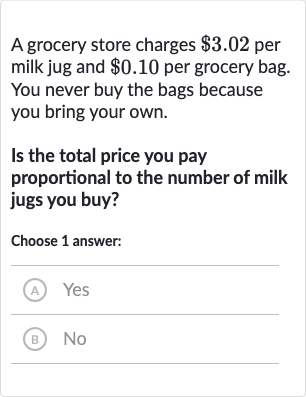Full solution
Q. A grocery store charges per milk jug and per grocery bag. You never buy the bags because you bring your own.Is the total price you pay proportional to the number of milk jugs you buy?Choose answer:(A) Yes(B) No
- Understand Proportionality: Understand the concept of proportionality. Proportionality means that if you buy more of an item, the total cost increases at a constant rate. Since you are only buying milk jugs and not the grocery bags, we need to check if the cost of milk jugs alone is proportional to the number of jugs you buy.
- Analyze Milk Jug Cost: Analyze the cost of milk jugs.The cost of one milk jug is . If you buy one jug, the cost is . If you buy two jugs, the cost is . If you buy three jugs, the cost is , and so on.
- Determine Proportional Relationship: Determine if the cost is proportional.Since the cost of each additional milk jug is always , and the total cost increases by this fixed amount with each additional jug, the relationship between the number of milk jugs and the total cost is proportional.
More problems from Is (x, y) a solution to the system of equations?
QuestionGet tutor help
QuestionGet tutor help

